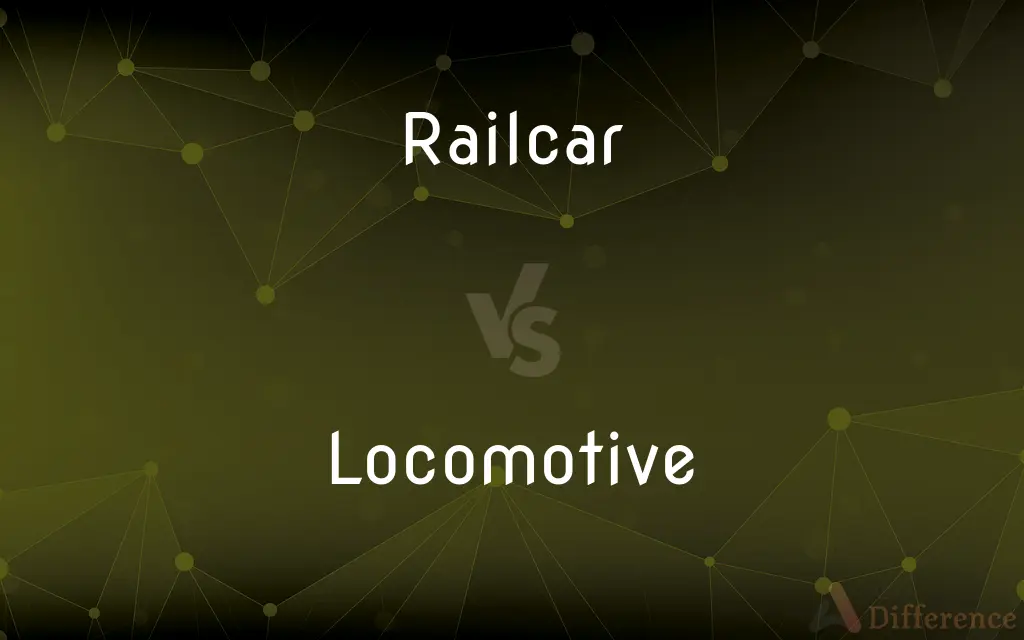Railcar vs. Locomotive — What's the Difference?

Difference Between Railcar and Locomotive
ADVERTISEMENT
Compare with Definitions
Railcar
A railcar (not to be confused with a railway car) is a self-propelled railway vehicle designed to transport passengers. The term "railcar" is usually used in reference to a train consisting of a single coach (carriage, car), with a driver's cab at one or both ends.
Locomotive
A locomotive or engine is a rail transport vehicle that provides the motive power for a train. If a locomotive is capable of carrying a payload, it is usually rather referred to as a multiple unit, motor coach, railcar or power car; the use of these self-propelled vehicles is increasingly common for passenger trains, but rare for freight (see CargoSprinter and Iron Highway).
Railcar
A railroad car.
Locomotive
A self-propelled vehicle, usually electric, diesel, or steam-powered, for pulling or pushing freight or passenger cars on railroad tracks.
Railcar
(rail) A self-propelled railway vehicle for passengers, similar to a bus.
ADVERTISEMENT
Locomotive
A driving or pulling force; an impetus
"The US could no longer serve as the locomotive for the world economy" (George Soros).
Railcar
(rail) A powered single railway vehicle designed for passenger transport, with a driver's cab in both ends; Not to be confused with motor coach/motorcar, which is a powered railway vehicle capable to haul a train.
Locomotive
Of, relating to, or involved in locomotion.
Railcar
(Only in Canada and US) Any unpowered railway vehicle
Locomotive
Serving to put into motion or propel forward
"It may be that the founding fathers overestimated the locomotive force of the collective and mutual self-interest" (Ian Davidson).
Railcar
A wheeled vehicle adapted to the rails of railroad;
Three cars had jumped the rails
Locomotive
Able to move independently from place to place.
Locomotive
Of or relating to a self-propelled locomotive.
Locomotive
Of or relating to travel.
Locomotive
(rail transport) The power unit of a train that pulls the coaches or wagons.
Rolling stock
Locomotive
(rare) A traction engine.
Locomotive
(slang) A cheer characterized by a slow beginning and a progressive increase in speed.
Locomotive
(archaic) Any of various early road vehicles, steam-powered, etc., forerunners of the modern car.
Locomotive
(economics) A country which drives the world economy by having a high level of imports, such as the United States.
Locomotive
Of or relating to locomotion.
Locomotive
Of or relating to the power unit of a train which does not carry passengers or freight itself.
Locomotive
Moving, or capable of motion.
Locomotive
Moving from place to place; changing place, or able to change place; as, a locomotive animal.
Locomotive
Used in producing motion; as, the locomotive organs of an animal.
Locomotive
A locomotive engine; a self-propelling wheel carriage, especially one which bears a steam boiler and one or more steam engines which communicate motion to the wheels and thus propel the carriage, - used to convey goods or passengers, or to draw wagons, railroad cars, etc. See Illustration in Appendix.
Locomotive
A wheeled vehicle consisting of a self-propelled engine that is used to draw trains along railway tracks
Locomotive
Of or relating to locomotion
Share Your Discovery

Previous Comparison
Virtuoso vs. Expert
Next Comparison
Urinal vs. Pissoir















































